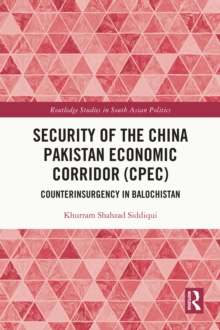
Security of the China Pakistan Economic Corridor (CPEC) : Counterinsurgency in Balochistan Hardback
by Khurram (University of Management and Technology, Pakistan) Siddiqui
Part of the Routledge Studies in South Asian Politics series
Hardback
Description
This book analyses the strategic and economic significance of the China-Pakistan Economic Corridor (CPEC), with a particular focus on the region of Balochistan.
Given the history of multiple insurgencies that the Pakistani Military has confronted in Balochistan, the book examines the region’s intricate conflict ecosystem and security landscape, which poses potential threats to the CPEC. Structured chronologically, the book traces the evolution of the Pakistani Army’s counterinsurgency practices inherited in 1947 from the British Indian Army’s culture of fighting small wars through to the contemporary counterinsurgency (COIN) adaptation in the “war on terror”, and afterwards, to the fifth round of the Balochistan insurgency.
The analysis centres on the development of counterinsurgency theory and practice by the Pakistani Army.
It empirically investigates the efficacy of the COIN strategy in Balochistan.
The author argues that the approach significantly changed after conceptualising the doctrine, especially from 2016 onwards, from “butcher and bolt” to the inclusion of critical components like political primacy, affect-based, and focused use of force, “winning hearts and minds” and rules of engagement.
As a result, there was reduced violence and an increased number of insurgent surrenders.
This book concludes that the Pakistani Army has largely controlled the insurgency in Balochistan.
However, simultaneously, there is an urgent need to reduce tangible support to the insurgents through porous borders and implement an effective strategy to sever the nexus between the Islamic State of Khorasan (ISKP) and the Baloch insurgent organisations, as well as the sectarian militant organisations in Balochistan province.
This is crucial to ending the insurgency and ensuring the security of CPEC. A novel contribution to the study of counterinsurgency and the importance of CPEC to China’s foreign policy and diplomacy, as well as its effects on the conflict dynamics in Balochistan, the book will be of interest to researchers studying War and Conflict Studies, Terrorism Studies, International Relations, Security and Strategic Studies, and South Asian and Chinese Studies.
Information
-
Out of stock
- Format:Hardback
- Pages:204 pages, 3 Tables, black and white; 12 Line drawings, black and white; 5 Halftones, black and whit
- Publisher:Taylor & Francis Ltd
- Publication Date:17/11/2023
- Category:
- ISBN:9781032538396
Information
-
Out of stock
- Format:Hardback
- Pages:204 pages, 3 Tables, black and white; 12 Line drawings, black and white; 5 Halftones, black and whit
- Publisher:Taylor & Francis Ltd
- Publication Date:17/11/2023
- Category:
- ISBN:9781032538396










